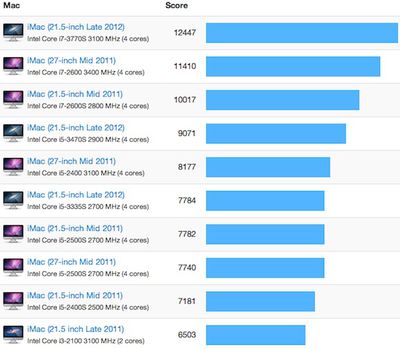New iMac Benchmarks Show 10-25% Improvement Over Previous Generation
Primate Labs today posted a summary of the new iMac benchmarks hitting the company's Geekbench Browser, showing fairly strong performance increases over the previous generation of machines. The analysis focuses on the 21.5-inch models, as the 27-inch models are not launching for several more weeks, and the latest high-end 21.5-inch model scores nearly 25% higher than its 2011 counterpart and even bests the high-end 27-inch model from last year by nearly 10%.

The report also pits the new 21.5-inch iMac against the current generations of Apple's other two desktop lines, the Mac mini and Mac Pro. The comparison to the Mac mini reveals that users can achieve nearly the same performance as the mid-range iMac by purchasing a high-end Mac mini, although customers would obviously have to supply their own displays and other peripherals.
What's interesting here, though, is how the quad-core Core i5 iMacs perform compared to the quad-core Core i7 Mac minis. Since Core i7 has hyper-threading technology (and the Core i5 does not), it can execute more instructions at once, leading to higher performance.
Here this means that the mid-range Mac mini is faster than the mid-range iMac that's almost twice the price. True, you do get a display and a discrete GPU with the iMac, but these Geekbench results show how powerful the new Mac mini is despite its size.
As for the Mac Pro, which is still stuck on older-generation processors rather than adopting Intel's Sandy Bridge E chips, the new iMac is now on par with all but the high-end 12-core Mac Pro models.
As for the new 27-inch iMac, a handful of Geekbench results have already appeared in the database running a special Build 12C2037 of OS X 10.8.2. The results indicate that an early benchmark that appeared in mid-May was indeed accurate and indicate that the new high-end 27-inch model will outperform its 2011 counterpart by nearly 15%.
Popular Stories
Apple will launch its new iPhone 17 series in two months, and the iPhone 17 Pro models are expected to get a new design for the rear casing and the camera area. But more significant changes to the lineup are not expected until next year, when the iPhone 18 models arrive.
If you're thinking of trading in your iPhone for this year's latest, consider the following features rumored to be coming...
In select U.S. states, residents can add their driver's license or state ID to the Wallet app on the iPhone and Apple Watch, providing a convenient and contactless way to display proof of identity or age at select airports and businesses, and in select apps.
Unfortunately, this feature continues to roll out very slowly since it was announced in 2021, with only nine U.S. states, Puerto Rico,...
Since the iPhone X in 2017, all of Apple's highest-end iPhone models have featured either stainless steel or titanium frames, but it has now been rumored that this design decision will be coming to an end with the iPhone 17 Pro models later this year.
In a post on Chinese social media platform Weibo today, the account Instant Digital said that the iPhone 17 Pro models will have an aluminum...
Three out of four iPhone 17 models will feature more RAM than the equivalent iPhone 16 models, according to a new leak that aligns with previous rumors.
The all-new iPhone 17 Air, the iPhone 17 Pro, and the iPhone 17 Pro Max will each be equipped with 12GB of RAM, according to Fixed Focus Digital, an account with more than two million followers on Chinese social media platform Weibo. The...
Apple is expanding the ability to add an Apple Account Card to the Wallet app to more countries, according to backend Apple Pay changes.
With iOS 15.5, Apple updated the Wallet app to allow users to add an Apple Account Card, which displays the Apple credit balance associated with an Apple ID.
If you receive an Apple gift card, for example, it is added to an Apple Account that is also...
Apple does not plan to refresh any Macs with updated M5 chips in 2025, according to Bloomberg's Mark Gurman. Updated MacBook Air and MacBook Pro models are now planned for the first half of 2026.
Gurman previously said that Apple would debut the M5 MacBook Pro models in late 2025, but his newest report suggests that Apple is "considering" pushing them back to 2026. Apple is now said to be...
Apple is continuing to refine and update iOS 26, and beta three features smaller changes than we saw in beta 2, plus further tweaks to the Liquid Glass design. Apple is gearing up for the next phase of beta testing, and the company has promised that a public beta is set to come out in July.
Transparency
In some apps like Apple Music, Podcasts, and the App Store, Apple has toned down the...
If you pay for iCloud storage on your iPhone, did you know that Apple offers you five perks beyond the extra storage space, at no additional cost?
Here are the perks included with all iCloud+ plans:Private Relay keeps your Safari browsing history entirely private from network providers, websites, and even Apple.
Hide My Email generates unique, random email addresses whenever needed.
Hom...




















